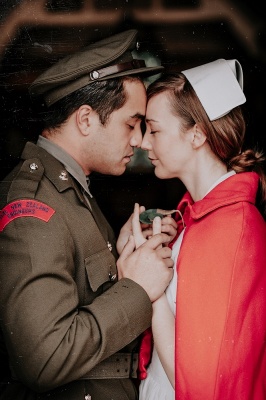NGĀ PUKE (The Hills)
Rotorua Little Theatre, 8 Amohau Street, Rotorua
11/09/2018 - 15/09/2018
IHI Festival - Indigenous Performing Arts Festival
Production Details
NGĀ PUKE is a story about a young Māori farmer and a budding artist who meet on the lush hillside of Ngā Puke in the Hawkes Bay, 1939.
Once young and free, the second act of the play sees Waru and Angie reunite three years later in the cold, violent setting of Crete during World War II.
Will the two ever make it back to the beautiful pastures of Pōrangahau?
Tuesday Sept 11 is the Opening Night Gala event with a Q&A after the show hosted by Rotorua Little Theatre.
Rotorua Little Theatre, 8 Amohau Street
11 – 15 September 2018
7.30pm
Tickets here
Theatre ,
Toitu te whenua whatungarongaro te tangata
Review by Semu Filipo 13th Sep 2018
Rotorua Little Theatre, or Shambles Theatre as it’s known to the locals, is a small, intimate 100 seat theatre where the art of story-telling is at its best. With light jazz music playing in the background, the smell of freshly-baked date scones and coffee and tea, you are transported the 1930s New Zealand.
Celebrating Te Wiki O Te Reo Māori, Ngā Puke – The Hills explores the romance between nurse turned artist, Angie Duncan, and farm boy Waru Thompson as they delicately make their way through their colliding cultures and up-bringings.
The set is bare, with Angie, sitting at her easel, taking in her beautiful surroundings before she begins to paint the Hawkes Bay landscape. Disrupting her peace Waru comes barging, in yelling to get the sheep who have turned loose from the gates being open, swearing at his dogs and, unexpectedly, Angie.
Even as Angie points out Waru’s flaring nostrils when he is angry and Waru corrects Angie’s attempts at te reo Māori, underneath it all, the human urge to connect with others shines through. As their eyes meet and smiles are exchanged, we see the beginning of something special.
Waru, or Number 8 to his mates (number 8 wire fixes everything), understands who he is and where he comes from in relation being a kaitiaki (guardian) of his whenua (land). This deep understanding his whānau (family) and whakapapa (lineage) are enlightening moments for Angie. Of Scottish heritage, she has come to New Zealand to start again and is finding it hard to adjust. Unsettling as it is for her to hear, Waru’s charm and cheeky Māori humour opens up the communication lines for both to begin to understand this collision of cultures in the world they now live in.
But this is not one-way traffic as Waru’s pure amazement at Angie’s art work draws him closer into the way she looks at the world. From the ‘cabbage tree’ to the ‘colour of the wool shed’, even to the pureness of the sky, Waru begins to see the world through Angie’s eyes in her paintings. It’s beautiful to hear, as news of World War II being declared adds conflict and a sense of urgency to choose: to stay, in Angie’s case; to ‘fight the good fight’ in Waru’s case. This is a tense moment in the play where actors Simone Walker and Kimo Houltham play the ‘truth’ of the scene brilliantly.
In Act 2 we see the effects of WWII as Waru, now Lieutenant in the 28th Māori Battalion, heads to the nurses station with a wound that “will be alright” but hasn’t gone away, and he meets Angie again. Falling into in a coma-like state, Waru’s dreams relive the moment where his platoon are dying before his eyes. As he recovers, Angie is forced to leave his bedside for another post, wondering if she will ever see Waru again.
John Broughton wrote this play in 1980, and its themes remain very relevant today. Whenua is more than dirt or a plot to build your first house on; it is a spiritual connection to our ancestors that lays the foundations of what many Māori believe in. Tūrangawaewae – where you stand – determines your role as kaitiaki for your whenua.
But in order to understand these elements more is important to have these open discussions. Yes, it may be hard to hear and yes people will feel uncomfortable, but talking will lead to action, if not for ourselves, for our children or children’s children.
Toitu te whenua whatungarongaro te tangata: The land remains forever, but people pass on.
Copyright © in the review belongs to the reviewer






Comments